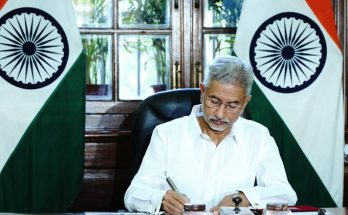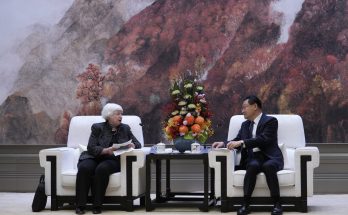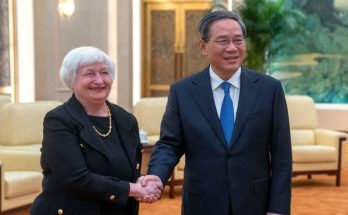 The China challenge or the China threat emerged as a leitmotif in a high-profile international conference in New Delhi, with India being upfront about its political differences with Beijing and asking the latter to respect India’s sovereignty in the course of building the China-Pakistan Economic Corridor.
The China challenge or the China threat emerged as a leitmotif in a high-profile international conference in New Delhi, with India being upfront about its political differences with Beijing and asking the latter to respect India’s sovereignty in the course of building the China-Pakistan Economic Corridor.
India, however, took care to eschew a negative adversarial construct of India-China relations, with Foreign Secretary S. Jaishankar making it clear that in New Delhi’s assessment, the rise of India and China can be “mutually supportive.” Prime Minister Narendra Modi, on his part, outlined briefly a template of harmonious India-China relations, saying “respect and sensitivity for each other’s core interests” holds the key.
“China is very sensitive on matters concerning its sovereignty. We expect they will respect other people’s sovereignty,” said Mr Jaishankar at the second edition of Raisina Dialogue, co-organised by India’s Ministry of External Affairs and Observer Research Foundation.
“CPEC passes through a territory that we see as ours. Surely people will understand India’s reaction. There needs to be some reflection and I am sorry to say that we have not seen signs of that,” stressed India’s top diplomat.
India’s CPEC and OBOR concerns
China has been seeking India’s support for the CPEC and has argued that it will benefit New Delhi by enhancing regional trade and connectivity. New Delhi has been, however, wary of this mammoth corridor as a part of it passes through the disputed region of Kashmir and amounts to accepting Pakistan’s occupation of the region. India also has other security anxieties about the project as it will deepen the strategic nexus between Beijing and Islamabad, all-weather allies and friends, through the Gwadar port and gives the two countries more room for manoeuvre vis-à-vis India. CPEC is also a key reason why India remains sceptical of China’s grand trans-regional connectivity project, One Belt, One Road, which seeks to straddle Asia, Africa and Europe. In his speech at the conference, Mr Modi also subtly impressed upon China that “respect for sovereignty is important for regional connectivity to improve.”
Rise of India & China mutually supportive
 Geopolitics of connectivity apart, India struck a largely positive note on its relationship with China, which suggests that the challenge in the coming days for the two Asian powers will be to manage their political differences on issues like terrorism and the Nuclear Suppliers Group, without losing sight of prospects of cooperation and partnership. “Broadly speaking, the growth in China’s power and its expression abroad remain a dynamic factor in Asia,” said Mr Jaishankar, a former ambassador of India to China.
Geopolitics of connectivity apart, India struck a largely positive note on its relationship with China, which suggests that the challenge in the coming days for the two Asian powers will be to manage their political differences on issues like terrorism and the Nuclear Suppliers Group, without losing sight of prospects of cooperation and partnership. “Broadly speaking, the growth in China’s power and its expression abroad remain a dynamic factor in Asia,” said Mr Jaishankar, a former ambassador of India to China.
“With China, the overall broadening of ties, especially in business and people-to-people contacts, has been overshadowed by differences on certain political issues,” he said. “But it is important for the two countries not to lose sight of the strategic nature of their engagement, or falter in their conviction that their rise can be mutually supportive.”
The Mandarin-speaking diplomat also hinted that despite differences, India will invest considerable diplomatic energy in turning around the relationship with China. “We will continue to invest more energy into this account in 2017,” said the foreign secretary.
Going forward, the two Asian giants will also have to navigate a complex geopolitical landscape and strive to reconcile their interests in different regions, which could emerge as source of potential dissonance and discord. In this context, Admiral Harry B Harris, who heads the US Pacific Command (PACOM), has cautioned India against increasing Chinese influence in the Indian Ocean region. “India should be concerned about increasing Chinese influence,” he said.
Author Profile

- Manish Chand is Founder-CEO and Editor-in-Chief of India Writes Network (www.indiawrites.org) and India and World, a pioneering magazine focused on international affairs. He is CEO/Director of TGII Media Private Limited, an India-based media, publishing, research and consultancy company.
Latest entries
 India and the WorldJuly 9, 2024Defying West, India sets $100 billion trade target with Russia
India and the WorldJuly 9, 2024Defying West, India sets $100 billion trade target with Russia India and the WorldJuly 5, 2024India at SCO: Takes swipe at Pakistan for cross-border terror, pushes alternative to BRI
India and the WorldJuly 5, 2024India at SCO: Takes swipe at Pakistan for cross-border terror, pushes alternative to BRI India and the WorldJune 14, 2024Modi’s Day 1 in Italy: Bonding with Britain, France
India and the WorldJune 14, 2024Modi’s Day 1 in Italy: Bonding with Britain, France India and the WorldJune 13, 2024G7 summit in Italy: Modi to showcase India as leader of Global South
India and the WorldJune 13, 2024G7 summit in Italy: Modi to showcase India as leader of Global South






